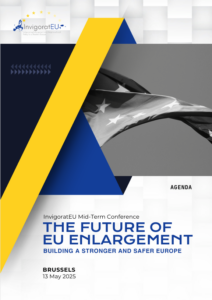Headquarters: Svetog Nauma 7, 11000
Office address: Đorđa Vajferta 13, 11000
Phone:: +381 11 4529 323

October 25, 2022 – European policy centre held a National Convent of the European Union working group session for chapter 3 “Right of establishment and freedom to provide services”, which is managed by CEP. In addition to the permanent members of the working group, the meeting was attended by a representative of the Ministry of Trade, Tourism and Telecommunications, which manages negotiation group 3, as well as representatives of the Chamber of Commerce of Serbia, NALED, lobbyist in the Republic of Serbia, Slovenia and the EU, and legal consultants engaged through the GIZ project to create an analysis in the field of crafts in the Republic of Serbia with recommendations.
The meeting was thematic in nature, and Dusan Protic, programme manager of CEP for the internal market and the coordinator of this working group opened the session and presented the discussion topic: issues of legal regulation in the field of crafts – previous and current legal initiatives, the goal of which is the adoption of the Law on Crafts, reasons for the adoption of this law, i.e., whether it is necessary to prepare and adopt a separate Law of crafts, implement changes and amendments to other sectoral regulations, or if it’s not necessary to implement changes and make amendments to the legislation, but to regulate the field of craft through “soft” law (codes, guidelines, recommendations etc., which are adopted by the Chamber of Commerce of Serbia and other business associations).
During the discussion, specifical challenges of the field of craft were presented, along with the experience of neighboring countries, and alternative solutions were also discussed.
The conclusion of the session was that there is a prevailing opinion that this area needs to be regulated by an umbrella law, whose goal should be preserving and further developing crafts, protection from unfair competition, guaranteeing quality, and protection of consumers. The legislative solution should be without restrictions and shouldn’t establish new obligations, along with establishing a registry of craft, in which the registration would be free and conducted electronically. These tasks could be performed by the Chamber of Commerce of Serbia as an intrusted public authority, alternatively Ministry of Economy, Ministry of Trade or The Serbian Business Registers Agency